Curated OER
Lena Horne: Race and the American Artist
Young scholars examine how race played a critical role in Lena Horne's life. They conduct Internet research, participate in a class debate, write a letter, and create a presentation based on their Internet research.
Curated OER
Black Actors in American Cinema
Young scholars examine the contributions of a few African American actors. After watching different films, they work together to recreate the film and the struggles faced by the actors. In groups, they compare and contrast the acting...
Curated OER
An Analysis of Jim Crow Laws and their Effects on Race Relations
First graders analyze the role of the Jim Crow laws on race relations. As a class, they are segregated based on the color shirt they have or some other simple criteria and wear either a square or circle sticker representing the majority...
Curated OER
The Power of Protest
High schoolers explain how Rosa Parks refused to give up her bus seat to a white man. They discuss how her actions were heroic and how they affected the civil rights movement. They reflect on the lesson in journal entries.
Curated OER
Lincoln, the Great Emancipator?
Students examine the motivating factors that prompted Lincoln to draft the Emancipation Proclamation in 1863. They examine Lincoln's social and political beliefs, particularly as they pertained to slavery and race in the United States.
Curated OER
And Justice for All?
High schoolers explore the history of the environmental justice movement. They examine how discrimination promotes environmental illness in low income communities. Students explain why minority and low income groups have less economic...
Curated OER
The Battleground: Separate and Unequal Education
Students examine the purpose and goals of education in African American society. They analyze photos, answer discussion questions, and participate in a class discussion.
Curated OER
Langston Hughes: Voice Among Voices
Students study Langston Hughes's poetry, short stories, and his first autobiography. They read and appreciate the candid, honest and powerful creative masterpieces of this black genius and discuss the numerous universal themes and...
Curated OER
The Impact of the Music of the Harlem Renaissance on Society
Students define the community of Harlem. They explain the growth of music in this area and identify important people who spearheaded this movement. They identify places where music grew in Harlem and establish a visual as well as an...
Curated OER
From Remus to Rap: A History in Theory and Practice of the African-American Storytelling Tradition
Students examine the specific form and function of tall tales and toasts.
They discover the importance of performance in the telling of a story and the importance of rhythm in the telling of toasts. They create stories of their own, in...
Curated OER
In Search of Rights
Seventh graders research Supreme Court cases. They formally debate court rulings, write a scenario portraying a possible futuristic America and participate in a field practicum for media production, while evaluating various social,...
Curated OER
Promoting Diversity in Elementary School Curricula
Learners discover the roles played by various racial, ethnic and religious groups in the development of American society. They explore the concept of racial and cultural diversity and global community, as these are joined by economic,...
Curated OER
Lesson Plan on Tolerance
Learners, through discussion, internet and video resources, study the history of Northern Ireland and the religious segregation between Catholics and Protestants. They evaluate the current political situation and predict what the future...
Curated OER
Another Perspective on Modern Civilization
Students consider the impact of current issues on the world population. In this global studies lesson, students discuss the pros and cons of modernization after they listen to a lecture about Gandhi's opinion of modern civilization....
Curated OER
Breaking the Unjust Law
Students consider the concept of civil disobedience. In this lesson on changing unjust laws, students use primary sources to understand how Gandhi and King changed the law. Students will then list laws that they feel are unjust and plan...
Curated OER
Get up, Stand up. Stand up for your Civil Rights.
Fourth graders study civil rights leaders. In this Civil Rights lesson, 4th graders investigate what it means to stand up for something you believe in after reading about Dr. Martin Luther King Jr. and President Obama. Students create a...
Curated OER
A Time to Break Silence
Eleventh graders investigate Martin Luther King's decision to speak out against the war in Vietnam. For this American History lesson, 11th graders read excerpts of MLK's speech. Students examine why King made the decision to speak out.
Curated OER
The Battleground: Separate and Unequal Education
Students investigate the history of unequal education in the United States and the impact on African American history. For this unequal history lesson, students discuss the purpose of education and describe an ideal school. Students...
Yale University
Yale New Haven Teachers Institute: Changing Attitudes in America
A collection of lesson plans that help teachers examine diversity, institutional racism, and other topics in social justice.
Other
Institute of Texan Cultures: Indi Visible: African Native American Lives [Pdf]
A collection of lessons to accompany an exhibit, available online, that examines the shared history and heritage of African Americans and Native Americans. Both groups were faced with exclusion from society and often joined together, in...
Yale University
Yale New Haven Teachers Institute: Negro Holocaust: Lynching and Race Riots
A instructional activity unit with good background information for students. Details the history of lynching and race riots in America and the treatment of African-Americans from 1880 to 1950.
Gilder Lehrman Institute of American History
Gilder Lehrman Institute: History Now: Securing the Right to Vote: Selma to Montgomery Story
[Free Registration/Login Required] Lesson plan asking this essential question: "What conditions created a need for a protest march from Selma to Montgomery in 1965 and what did that march achieve?"
Georgetown University
Georgetown University: Slavery at School
This unit teaches students about the history of the Catholic Church and slavery in the United States. The goal is for students to gain critical knowledge of the Catholic Church and Catholics' contradictory roles during the age of...


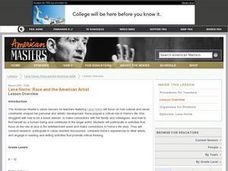





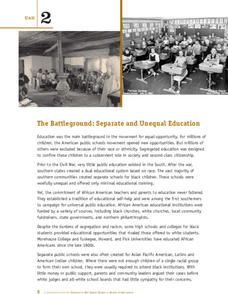

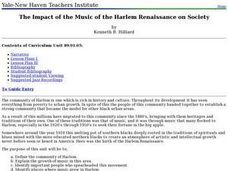





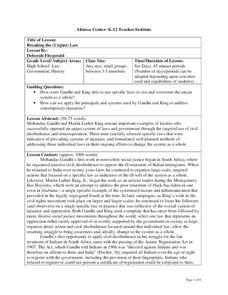
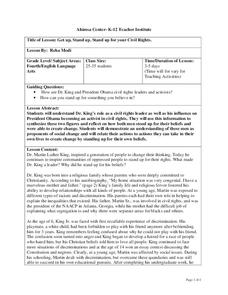



![Institute of Texan Cultures: Indi Visible: African Native American Lives [Pdf] Lesson Plan Institute of Texan Cultures: Indi Visible: African Native American Lives [Pdf] Lesson Plan](https://d15y2dacu3jp90.cloudfront.net/images/attachment_defaults/resource/large/FPO-knovation.png)
